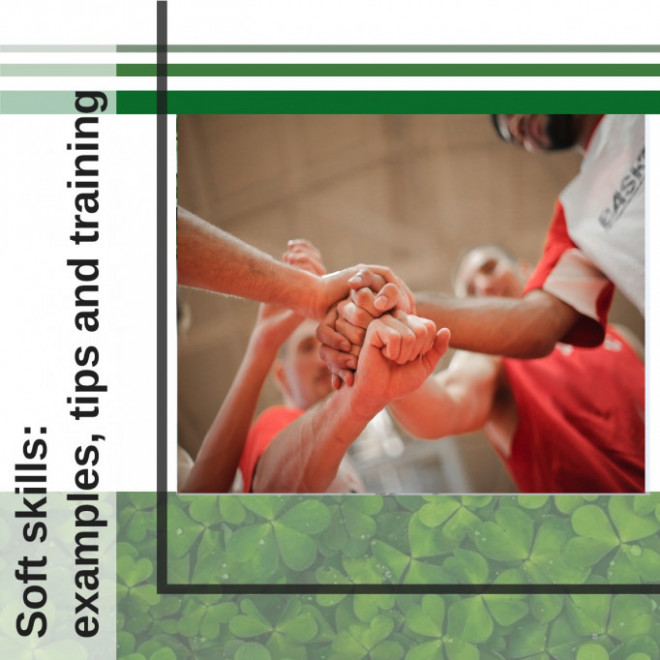Soft skills are more important for professional success than technical or hard skills. Knowledge is power, but far more powerful is the right way to deal with people. Soft skills are defined as methodical, personal and social competences that are characterized by interdisciplinary qualifications and are reflected in the personality and behavior of a person.
In contrast to know-how and hard facts, soft skills are much more difficult to measure, but they themselves play an increasingly important role as “soft” factors in applications or promotions. Those who cannot score with the key qualifications stand on the spot.
Here we explain what you need to know about soft skills, show examples of relevant soft skills and give tips on how you can learn and develop the most important skills, so let’s go.
What types of soft skills are there?
A distinction is made between soft skills in three areas:
Personal competence
Also called "personal" skills. This includes soft skills that relate to oneself and how to deal with yourself. For example, self-reflection, self-confidence or self-criticism. The level of personal competence also influences the next area of soft skills to a large extent.
Social competence
These include skills in dealing with other people. They are important for every interpersonal contact and decide how positive, sympathetic and harmonious (empathetic) the relationship and cooperation is perceived.
Methodical competence
These competencies and skills help to solve tasks and problems, to learn methods and to acquire (hard) qualifications. They are an essential prerequisite for the acquisition of hard skills. These include, for example, self-discipline and tolerance for frustration.
Why are soft skills so important?
Admittedly, the hard skills are the backbone of every application. If these qualifications are missing, even though they were explicitly mentioned in the job advertisement, the applicant has little chance of getting the job. It is they who enable the potential employee to do his or her job professionally.
However, not only a handful of candidates apply for a vacancy, for large companies there are often hundreds of applications that end up on the desk of the HR manager. The problem with the choice is not the quantity, but the similarity.
Dozens of applications with almost identical hard skills. The same degree, the same focus, similar grades, comparable internships at similar companies ... The best chance is then given to the applicant who brings along sought-after soft skills, who convinces with personality and fits better into the team. Soft skills can often even outplay supposedly better technical skills.
In short: soft skills are a competitive advantage. But why is it like that?
It's simple: the soft skills hide the potential of a candidate. You can also acquire knowledge by dull memorizing - using it together with others and in a team is a completely different story. Employability goes hand in hand with soft skills. Sounds complicated, but it basically means that working people have more opportunities on the job market thanks to their versatile skills.
Those who bring openness, willingness to learn, strong communication skills and emotional intelligence are less likely to be offended, bring others on board, convince and achieve more. And that's exactly what matters in companies with large workforces. Different characters regularly collide in the social enclosure office: being able to deal with them is great art - and essential for success.
Let's put it as it is: Success at work consists at best of ten percent of performance, but more so from psychology, sociology, strategy, diplomacy, publicity and a dash of travesty.
Tips for soft skills
Soft skills are becoming increasingly important in the application process, many applicants process letters and CVs according to the motto: a lot helps a lot. Just mention everything, any of it will be fine. To ensure that you use soft skills correctly in your application, you should note these tips:
Concentrate on your actual skills
The list of soft skills is long. Not everyone can have every ability. You should therefore remain truthful in your application. Finally, you have to get through the trial period. Nobody gets ahead with lies. In the worst case scenario, you not only get rid of your job during the trial period, but you have also gambled away your credibility, which could possibly get around to other HR staff.
Filter out which soft skills are sought
Your application should focus on the soft skills that are relevant to the position you are seeking. The best approach for this is provided by the information from the job offer. Here, there are often precise requirements that an employer makes of applicants - not only in terms of the subject but also in the area of social skills.
Once you have filtered out the relevant skills, you can concentrate on the really important aspects instead of just listing as many skills as possible that may have nothing to do with the position. In this way you also show HR managers that you have prepared yourself, that you know your own skills and strengths and how you want to use them in the company in order to contribute to success.
Pay attention to the wording of your soft skills
I make quick and correct decisions and have a high degree of initiative. That may sound good, but in an application these are pretty common and often empty phrases. The right wording can make a big difference in the effectiveness of your soft skills.
Be as specific as possible and go into your soft skills, for example how you could use them in previous jobs and projects to achieve success. Meaningless phrases are recognized as such by HR personnel and do not bring any advantage.
Formulation examples for soft skills
In almost every application you will find formulations in the style of I have a quick grasp, flexibility is one of my strengths or I also bring enormous motivation and willingness to perform - such a form of quantification and evaluation makes sense, but is not that easy.
When is the comprehension really quick or at least faster than with others? At what point does great motivation begin that sets you apart from other applicants? Such classifications can hardly be made on the basis of clear and objective criteria, rather they are purely self-assessments. This can reduce the informative value and positive effect. After all, everyone can certify particularly strong soft skills with decorative adjectives.
It is therefore better if you demonstrate your soft skills with examples. This way your soft skills become traceable and credible. Where others only use empty words, you can plausibly sell your soft skills and secure an important advantage in the battle for coveted jobs.
Soft skills: training and skills enhancement
Soft skills are closely linked to the respective personality and are often acquired and trained in childhood and adolescence. In adulthood, many people ask the question: Is soft skills training possible at all?
The good news: Yes, you can work on some social skills and strengths to improve them. The bad news: It is not child's play to train soft skills, it takes time and effort.
The following tips can make your soft skills training a success:
Analyze the initial situation
At the beginning there is always self-analysis and self-reflection: what are your strengths? Which soft skills do you already master? What else should you work on? By analyzing the initial situation you get a status quo, a starting point for your development and the training of your soft skills. It is important to be honest with yourself. Do not lie in your pocket and talk about your own social skills better than they really are. A potential analysis can help you with this.
Set your goals
The next step is to look to the future. Ask yourself why you want to train which soft skills. Perhaps it increases the application chances or brings you closer to a promotion to a management position. This enables you to identify the most important soft skills that you should definitely work on. If you get stuck on your own, talking to a company or your line manager can help. Find out which soft skills are particularly relevant and in demand.
Look for training opportunities
After the preparation, the implementation and the actual soft skills training are pending. Start looking for different offers to work on the skills. There is advice and tips on almost all skills on the Internet or books and reading. This enables independent study in which you can acquire and train knowledge. If you need more support, you can attend courses and seminars or work with a coach who helps with soft skills training.
Implement the skills in everyday life
Social skills are only really internalized if they become a habit. Therefore, use your everyday life to train soft skills. For example, work on sports or in private projects on your teamwork, reliability or goal orientation. Put what you have read and learned into practice again and again. In the end, the soft skills training works according to a simple principle: practice, practice, practice! Do not stay alone, but go among people. This is the only way to recognize how your new soft skills work in interpersonal contact.
Develop yourself
When you work on your soft skills, you have already taken the first important step in the right direction. A big, but unfortunately common mistake: to believe that soft skills are finally mastered and mastered. Rather, it is an ongoing process. Only if you stay tuned in the long term, develop further and train your soft skills, will they remain intact. Framework conditions can change quickly and affect your soft skills. Don't make the mistake of neglecting your soft skills training.
List with examples: from BrainyHR
|
Interpersonal Skills |
|||
|
Communication skills: |
Clarity |
Humor |
|
|
Confidence |
Mentoring |
||
|
Respect |
Networking |
||
|
Empathy |
Sensitivity |
||
|
Listening |
Patience |
||
|
Verbal communication |
Tolerance |
||
|
Non-verbal communication |
Public speaking |
||
|
Written communication |
Positive reinforcement |
||
|
Constructive feedback |
Diplomacy |
||
|
Friendliness |
Empathy |
||
|
Teamwork |
Conflict management |
Time Management |
Goal setting |
|
Delegation |
Prioritizing |
||
|
Listening |
Self-starter |
||
|
Active listening |
Planning |
||
|
Collaboration |
Decision making |
||
|
Cooperation |
Focus |
||
|
Coordination |
Delegation |
||
|
Idea exchange |
Stress management |
||
|
Mediation |
Coping |
||
|
Negotiating |
Organization |
||
|
Adaptability |
Curiosity |
Leadership |
Project management |
|
Self-management |
Empathy |
||
|
Decision-making |
Selflessness |
||
|
Calmness |
Agility |
||
|
Optimism |
Listening |
||
|
Open-mindedness |
Humility |
||
|
Analysis |
Cultural intelligence |
||
|
Self-confidence |
Authenticity |
||
|
Organization |
Versatility |
||
|
Self-motivation |
Generosity |
||
|
Trust |
|||
|
Problem-Solving |
Analysis |
Attention to Detail |
Critical observation |
|
Lateral thinking |
Listening |
||
|
Logical reasoning |
Organization |
||
|
Initiative |
Scheduling |
||
|
Persistence |
Analysis |
||
|
Observation |
Introspection |
||
|
Persuasion |
Memory |
||
|
Negotiation |
Acuity |
||
|
Brainstorming |
Recall |
||
|
Decision making |
Questioning |
||
|
Creativity |
Divergent thinking |
Work Ethic |
Integrity |
|
Inspiration |
Responsibility |
||
|
Imagination |
Discipline |
||
|
Reframing |
Initiative |
||
|
Mind mapping |
Dependability |
||
|
Insight |
Commitment |
||
|
Innovation |
Self-motivated |
||
|
Experimenting |
Professionalism |
||
|
Questioning |
Teamwork |
||
|
Design |
Time-management |


 Posted on Jun 26, 2020 by Anna
Posted on Jun 26, 2020 by Anna


